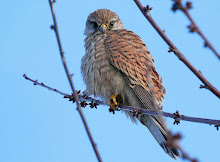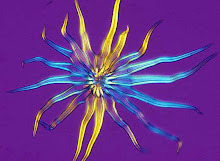Hogweed umbels are a hive of activity at this time of year, with a constant procession of insects arriving on the flat plates of flowers to either feed on pollen and necter, mate or hunt other insects. This visitor is a male slender-bodied digger wasp Crabro cribrarius which, as far as I could tell, was after plant food rather than animal prey. The female, on the other hand, is a hunter of flies, paralysing them with her sting and then incarcerating them in chambers at the end of an 8 centimetre-long tunnel that she digs in sandy soil. Take a close look at the insect in the picture and you'll notice something odd about its front legs, where one leg segment is broadened out into a flat plate. It looks like it's wearing boxing gloves.
There's a picture of a female here.
Johann Fabricius, the 18th. century entomologist who named this species, gave it the epithet cribrarius -a word meaning sieve - on account of the pattern of pale markings on the foreleg plate that makes it look like a sieve (or more like a collander, if you spend a lot of time in the kitchen). As far as I know, no one has every adequately explained what that odd-shaped leg is for. Not for digging or hunting - the female, which lacks this feature, does that. The suspicion is that males have them as an aid to gripping their mates during mating.
Crabro cribrarius is only about a centimetre long, so is easily overlooked. This one was photographed on the cliff path between Craster and Howick, on the Northumberland coast, last Saturday.


























Well.well..holding her in a boxing grip,eh? His name suits him.
ReplyDeleteCool photos! I myself have never come across this species, but according to some research in Crabro cribrarius and in some other wasps and bees, the female is blinded with the male 'gloves' see my post on this for more info:
ReplyDeletehttp://abugblog.blogspot.com/2010/05/leaf-cutters-are-back.html
Hi lotusleaf, umbelliferous plants are an excellent place to find interesting insects ...
ReplyDeleteHi Blackbird, amazing! I'd never have guessed that is what they are for.... thanks!
ReplyDelete